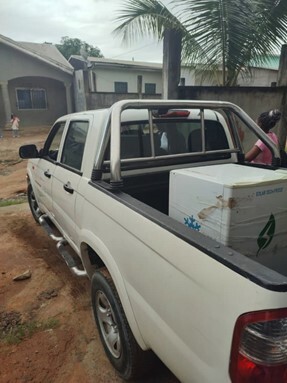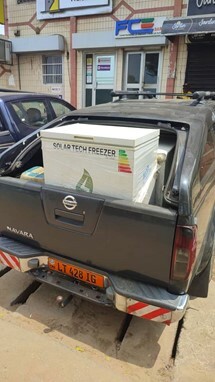Niger Basin Nexus Acceleration Programme // Article Series No. 5: Acceleration of the winning startups of the WEF Nexus bootcamp: Clean Energy Services
Clean Energy Services is a young Cameroonian startup whose mission is to develop energy and solar solutions (solar pumps, aquaponics, solar coolers) to increase agricultural production and reduce post-harvest losses in rural and peri-urban areas in the Sahel.

Recycled solar tech freezers powered by solar PV
This article is also available in French.
Battery-free solar freezers to reduce post-harvest losses in the Sahel
Clean Energy Services is a young Cameroonian startup whose mission is to develop energy and solar solutions (solar pumps, aquaponics, solar coolers) to increase agricultural production and reduce post-harvest losses in rural and peri-urban areas in the Sahel. Its main products are the "Bi-Solar Tech Fridge" and "Bi-Solar Tech Freezer", a solar refrigerator and freezer without battery storage. They combine solar thermal and solar photovoltaic energy for the conservation of food, vaccines and other heat-sensitive products in areas with low electrification rates. GIZ is supporting Clean Energy Services for the scale-up of its freezers, in the framework of the WEF-Security Nexus Acceleration Program implemented by the 2iE Institute.


First prototype of the bi-solar tech fridge (2019): solar refrigerator with a carcass entirely made of wood and powered by solar thermal and solar PV energy
Engineering for food security in the Far North of Cameroon
In 2020, Triomphant Tchulang and two other energy engineers from the Polytechnic Institute of Maroua, embraced the challenge of combining solar thermal energy and solar photovoltaic energy to produce the first solar-powered refrigerators and freezers without the need for storage batteries. In the absence of conservation and processing methods for food products, the Bi-Solar Tech Fridge/Freezer contributes to the reduction of post-harvest losses, estimated at nearly 40%, in the Sahelian region in the Far North of Cameroon. These losses threaten food security in the region, which already faces the challenges imposed by the harsh climate and invasions by migratory birds and insects.
A second life for freezers and a gesture for the ozone layer
At the beginning of the Bi-Solar Tech Fridge/Freezer manufacturing process, used freezers at the end of their life were destined for the landfill and abandoned. Clean Energy Services recovers these freezers, stripping them to separate the reusable parts to produce new freezers (carcass and insulation system), from the non-usable parts. For each recycled freezer produced, Clean Energy Service reuses an average of 85 to 90% of the mass of the used freezers (27 to 60 kg of scrap metal depending on the volume and model of the freezer) and saves 0.8 to 1 kg of chlorofluorocarbons (CFCs) from landfill. These refrigerant gases found in the compressors of freezers have a warming power of 5000 to 14000 times more dangerous than CO2, besides contaminating soil and water.


Delivery of Solar tech fridge: Photovoltaic solar powered freezers (PV)
Born from the dream of 3 young engineering students, Clean Energy Services team is now composed of 13 permanent employees and has a production capacity of one freezer per month.
For the next few years, Clean Energy Services aims to industrialize its manufacturing process in order to increase production and efficiency, while satisfying its customers. This scaling up will allow the startup to make solar freezers available to the population all around the year, contributing to preserve hundreds of tons of fruits and vegetables in the Sahel as well as to protect the ozone layer.


Recycled fridge and freezer produced by Clean Energy Services
Challenges and Perspectives
During the acceleration, Clean Energy Services is supported in the optimization of the operation of its solar freezers, the development of a solution for the management of CFCs and HCFCs and the optimization of the environmental impacts of its activities.
